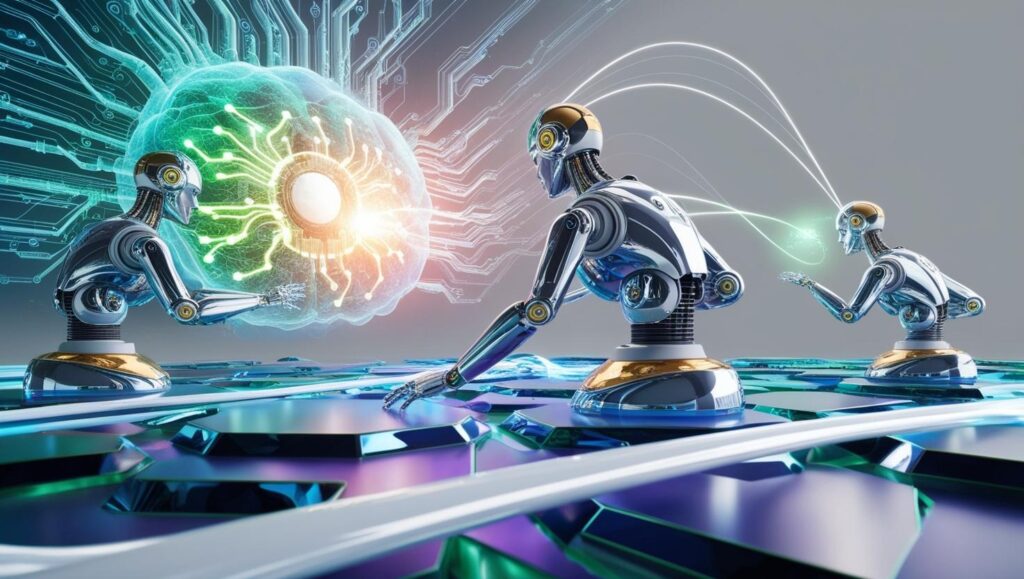Artificial Intelligence (AI) continues to evolve at an unprecedented pace, reshaping industries and redefining the way businesses operate. With the rapid integration of AI into everyday life, staying updated on trending AI’s is crucial for companies looking to maintain a competitive edge. From autonomous systems to AI-driven cybersecurity, let’s explore the latest advancements shaping the future.

AI-Powered Automation: Transforming Workflows
Automation, powered by AI, is streamlining operations across multiple sectors. Businesses are integrating AI-driven solutions to improve efficiency, reduce costs, and enhance decision-making. In manufacturing, robotic process automation (RPA) is replacing repetitive tasks, while in customer service, AI chatbots handle inquiries with human-like responses.
Additionally, AI-driven analytics provide real-time insights, allowing businesses to make data-driven decisions instantly. As machine learning models become more sophisticated, automation will continue to expand into finance, healthcare, and supply chain management, making processes smarter and more efficient.
Generative AI: Revolutionizing Content Creation
Generative AI is one of the most trending AI’s, pushing the boundaries of creativity and content generation. From text-based models like GPT to AI-powered image and video generation tools, this technology is transforming industries such as marketing, gaming, and entertainment.
Companies leverage generative AI to create personalized marketing campaigns, automate social media content, and even develop virtual influencers. With advancements in deep learning, AI-generated content is becoming more realistic, blurring the lines between human and machine creativity. However, this rapid growth also raises ethical concerns, especially regarding misinformation and copyright issues.
AI in Cybersecurity: Strengthening Digital Defenses
Cybersecurity threats are evolving, and AI is playing a crucial role in defending against sophisticated cyberattacks. AI-powered threat detection systems analyze vast amounts of data in real time, identifying anomalies and predicting potential breaches before they occur.
Machine learning algorithms enhance threat intelligence by recognizing patterns in cyber threats, allowing organizations to implement proactive security measures. As cybercriminals also adopt AI-driven techniques, the battle between security professionals and attackers continues to escalate, making AI-driven cybersecurity solutions more critical than ever.

AI and the Rise of Autonomous Systems
Autonomous AI systems are making significant progress, particularly in industries such as transportation, logistics, and healthcare. Self-driving cars, drones, and AI-powered robots are becoming more efficient and reliable, reducing human intervention in complex tasks.
In healthcare, AI-driven robotic surgery is improving precision and patient outcomes. Autonomous AI assistants are also transforming elderly care, offering companionship and real-time health monitoring. As these technologies continue to evolve, regulatory frameworks must adapt to ensure safety and ethical considerations are met.
Ethical AI: Addressing Bias and Transparency
As AI becomes more prevalent, ethical concerns surrounding bias, privacy, and transparency are gaining attention. Organizations are working towards developing explainable AI (XAI) to enhance trust and accountability in AI decision-making processes.
AI bias, often stemming from imbalanced training data, can lead to unfair or discriminatory outcomes. To combat this, researchers are implementing fairness algorithms and diverse datasets to improve AI accuracy. Governments and tech companies are also introducing regulations to promote responsible AI development, ensuring ethical considerations remain a priority.
AI’s Role in Sustainable Development
AI is contributing to sustainability efforts by optimizing energy consumption, reducing waste, and improving resource management. Smart grids powered by AI enhance energy efficiency, while AI-driven climate models help predict environmental changes more accurately.
In agriculture, AI-powered drones monitor crops, detect diseases, and optimize irrigation, leading to increased yields and reduced environmental impact. As global sustainability challenges grow, AI will continue to play a vital role in creating innovative solutions for a greener future.

Conclusion
The rapid advancements in AI and automation are reshaping industries and redefining possibilities. From trending AI’s in content creation to AI-driven cybersecurity and sustainability, the future promises increased efficiency, enhanced security, and innovative solutions. However, ethical challenges and regulatory concerns must be addressed to ensure responsible AI development.
As AI continues to evolve, staying ahead of these trends is essential for businesses and individuals looking to harness its full potential. The question remains: how will AI transform your industry next?